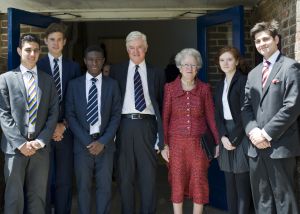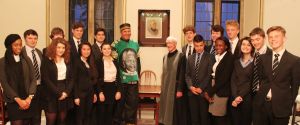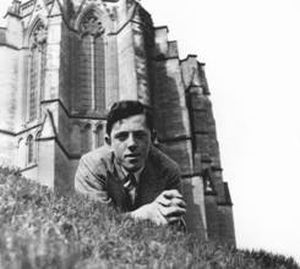Lancing College recently celebrated the life and legacy of one of its most distinguished alumni, Bishop Trevor  Huddleston CR.
Huddleston CR.
THE HUDDLESTON CENTENARY LECTURE for pupils, parents and staff, featured talks by Chris Lubbe, originally from Durban, South Africa, where he spent most of his life involved in the struggle against apartheid, and Fr Nicolas Stebbing, who was born in Rhodesia, joined the same community as Huddleston at Mirfield and cared for him there in the time leading up to his death.
Chris Lubbe gave a fascinating first-hand account of life in South Africa during the years of apartheid, and his work with inspirational figures such as Nelson Mandela, Archbishop Desmond Tutu, Oliver Tambo and FW De Klerk. Fr Nicolas Stebbing CR spoke about his own experiences when caring for Huddleston.
Fr Nicolas was at Lancing College and Lancing Prep for several days throughout the week, helping pupils understand the context of apartheid and why it needed to be overthrown.
THE TREVOR HUDDLESTON CENTENARY MEMORIAL SERVICE was a Service of Thanksgiving celebrating the life of Huddleston in the School that nurtured him.
Communities and organisations worldwide, with which Huddleston was most associated, joined the School on this very special occasion. Fr Stebbing gave the sermon, and the renowned Lancing College Chapel Choir sang during the Service.

A collection was made for the UK-based charity, Tariro, which supports young people, orphans and others who need it, in Zimbabwe.
The Service was followed by a special lunch for guests, who included Lord and Lady Parkinson, Chris Lubbe and Mel Howse, designer of the Huddleston Memorial Window in Lancing College Chapel, which was dedicated by Archbishop Desmond Tutu in 2007.
After lunch, Lady Parkinson, Huddleston’s niece, spoke about some of her personal memories of Huddleston.

FATHER TREVOR HUDDLESTON (1913-1998) wrote that: “Lancing, I think, was a place that allowed me to grow very much to be what I wanted to be.” An Anglican priest, whose remarkable ministry spanned over half a century, Father Huddleston is best known as one of the founders, and President, of the Anti-Apartheid Movement. Archbishop Desmond Tutu, a friend of Huddleston for over 50 years, said of him:
“If you could say that anybody single-handedly made apartheid a world issue then that person was Trevor Huddleston.” Father Huddleston had a love and respect for all people, regardless of race or religion.
When he first met Tutu, the latter was a young boy with his mother in Johannesburg. He was amazed when he saw the priest doff his hat to Mrs Tutu – an extraordinary act of respect from a white man to a black woman, at that time. A figure of international importance, Huddleston was radical, fearless and an inspiration to freedom fighters throughout the world. His achievements cannot be over-estimated.
Trevor Huddleston spent much of his ministry in Africa, as a member of the Community of the Resurrection. Huddleston had joined this community at Mirfield in West Yorkshire, and it was through their work in South Africa that he found his vocation.
As a young priest in Sophiatown, a black residential area in Johannesburg, he became an anti-apartheid activist and earned the nickname Makhalipile, “dauntless one”. In 1955, the ANC bestowed on him the rare honour of "Isitwalandwe".
He was made Bishop of Masasi, Tanzania (1960), Bishop of Stepney (1968), Bishop of Mauritius (1978), and Archbishop of the Province of the Indian Ocean (1978). In 1998, he was made a KCMG.
TREVOR HUDDLESTON: LANCING PUPIL
“I then went to my public school, which was Lancing, a church school and a very typical English public school, except that I think it had moved quite a long way beyond the normal because relationships with the staff were particularly easy.
There was no feeling that one was being kept down and we were allowed a great deal of freedom for those days. It was a marvellous place on the South Downs, and you had all the room in the world to move around in.
It didn't put enormous emphasis on games which I was never much good at. I quite enjoyed playing rugger (although it was a soccer school) as it was easier, and if you're not any good at it soccer is rather a boring game; and I ran a bit.
“Lancing, I think, was a place that allowed me to grow very much to be what I wanted to be. Because it was a church school, religion was very dominant.
“The chapel there is one of the finest modern Gothic buildings in England, and the fourth highest, and dominated the whole school.
“We used to have to go to chapel twice a day, and three times on Sundays. But again, in those days there wasn't any sense that this was peculiar: it was just something you accepted as part of the system and you went along with it.
And enjoyed it, in fact. I enjoyed the music. Peter Pears, the singer, who was a bit older than me, was also at the school. He was an alto in the choir. There was a high standard of music.
“Then I became interested in writing and I became the editor of the school magazine and I contributed to another literary magazine. I don't think I was in any way exceptional as a writer but it gave me a kind of fulfilment.
“During those years the school had what was called a 'mission' down in Camberwell, which in those days was one of the very poorest slum areas in London. I used to go there with one or two friends, as we were invited to do; to stay down there and see how the other half lived you might say. It certainly had an impact on me because the kids were barefoot and obviously lots of them had rickets and were malnourished. So it was quite an eye-opener for somebody who had been brought up in Hampstead, and it certainly did something to turn my mind to the social divide in this country.”
THE TREVOR HUDDLESTON SCHOLARSHIP
Lancing College now offers a scholarship in memory of Bishop Trevor Huddleston
The scholarship is a free two-year Sixth Form place, awarded annually, for a pupil from South London, who could not otherwise benefit from a Lancing education. Father Huddleston carried out invaluable work in this part of London.
In 1968, Huddleston returned from Tanzania, as the Bishop of London had invited him to become Suffragan Bishop of Stepney. Here he was responsible for the boroughs of Tower Hamlets, Hackney and Islington. Pakistanis from East Pakistan (Bangladesh) were settling in the area. Although, eventually, Bangladeshis became well established, they were suffering considerable persecution at that time. Huddleston immediately became involved in protest meetings and leading delegations to the House of Commons, on their behalf.